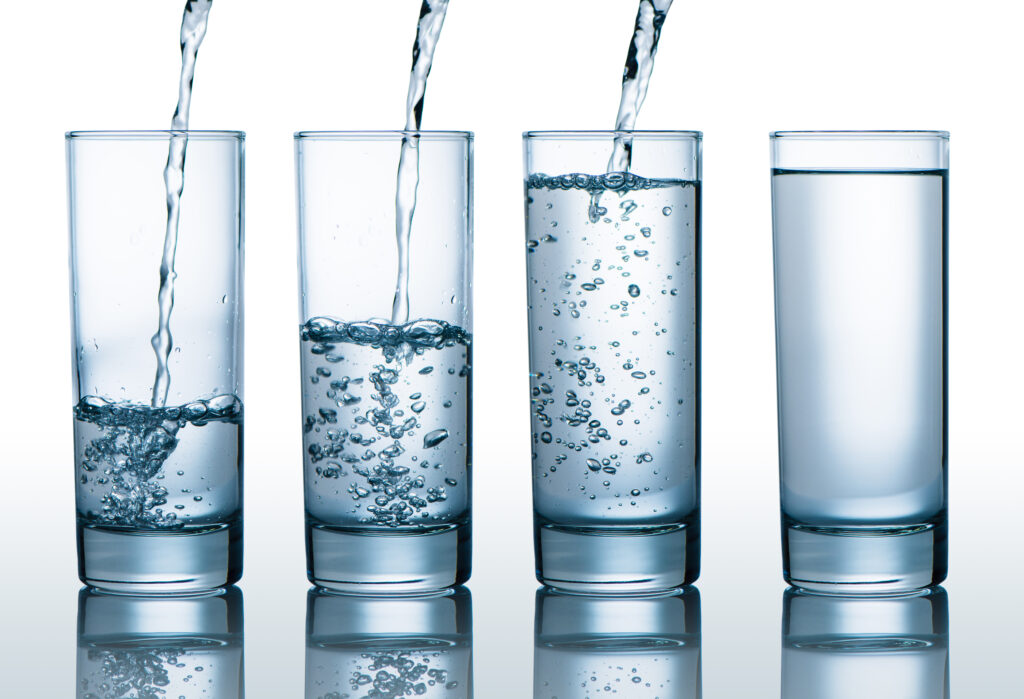If you’re like the majority of people I talk to, you’re probably not drinking enough water. It’s often quite surprising how many people forget to drink water.
Staying well hydrated helps your mood, improves your brain function, and prevents fatigue.

Why is water necessary?
You have likely heard that your body is 60% of water. Here are some of the ways your body uses it:
- Maintaining healthy joints and skin
- Conducting electrical signals among nerves and muscles (including your heart)
- Supporting healthy and normal digestion (from mouth to anus)
- Detoxifying (think liver, kidneys, lungs, sweat, tears, urine)
- Supporting optimal brain function, including alertness, focus, and good mood
- Promoting dental health by cleaning your mouth, support saliva, washing away harmful bacteria, and neutralizing acids that harm teeth.
- Improving urinary tract health by diluting urine as well as flushing bacteria out
Reducing kidney stone occurrences (by flushing the kidneys with water) and supporting total kidney health - Lowering blood sugar by diluting blood volume (this is so important for people with high blood sugar)
How much water do you need?
The following recommendations may be much higher than you’ve heard (8 cups per day).
The National Academy of Medicine recommends drinking about 11 cups of water for women and about 16 cups for men per day.
The American Academy of Pediatrics recommends that an active child drink 6-8 cups of water per day.
These recommended amounts may be higher if you’re taking diuretics, drinking caffeine, or engaging in activities that increase sweating.
How to easily increase your water intake
Keep a large water bottle nearby you, always.
This means on your desk, your nightstand, and in your car. If you are in the habit of just getting a glass of water here and there, chances are that you’re simply not going to break whatever activity you’re doing to fill a glass of water. Keeping your bottle handy – right next to you and in sight – will visually remind you to take a few swigs throughout the day. For your health and the health of our environment, I recommend purchasing a stainless steel water bottle.
Start your morning off with a full water bottle.
This helps you more easily track the amount you’re getting in a day, as you can pretty easily see how much you’ve consumed.
Hydrate first thing in the morning.
Your body loses hydration during sleep. It also spends a lot of the night detoxifying and repairing cells. Water is necessary to support healthy cellular function, for detoxifying, and to wake up your brain. You might even find you don’t need as much caffeine in the morning, as hydration is energizing.
Filter your water.
Often, people tell me they just don’t like the taste of water. If drinking chlorinated water that contains other non-essential ingredients from the water table (like medications, pesticides, herbicides, nitrates, or heavy metals) doesn’t taste great to you, then getting a charcoal filter can go a long way to improving the water taste. Plus, filtering out a few toxins from your water supply is much better for your health, as you won’t be drinking up extra pollutants. Berkey is the water filtration system I’ve used for years (I can filter out all the contaminants mentioned above, as well as fluoride). Here is my affiliate link for this filter (thanks for your support).
Consume more soups and smoothies.
These naturally contain more water. In fact, I usually recommend people make smoothies with water instead of milk. (Hit reply on this email if you’d like me to send out smoothie recommendations in a future newsletter.)
Stock up your tea cabinet with herbal teas.
I love that herbal teas add good flavor and good nutrition to your mug. And naturally, non-caffeinated beverages offer hydration too! My favorite tea brands are Yogi Teas and Celestial Seasonings.
Evaluate your caffeine habits. Caffeine, which I personally enjoy daily, is also dehydrating. When you feel an energy slump, try swigging from your water bottle before you hit up the caffeine. You may discover that your fatigue was from dehydration, and not from a caffeine deficiency.
Adjust the temperature of your water. Since it is often harder for people to drink cool water during the winter, this is a risk factor that can lead to dehydration. Enjoy warm herbal teas in the winter to help you stay hydrated. In colder months, you might be more enticed by warm-ish water instead of cold.
Do you need more hydration?
The following are signs you may need more water:
- Dark yellow or amber urine
- Infrequent urination (a well-hydrated person will make frequent trips to the bathroom. This is a great excuse to get extra stretch breaks in your day!)
- Feelings of dizziness, headache, fatigue, poor focus or poor mood
- Recent physical activity without proper rehydration
- Thirst or dry mouth (these are usually signs that you’re already dehydrated)
- Infrequent urination
- Illness, especially when vomiting or diarrhea are involved.
Water is generally the best for rehydrating
Fluids that are generally less healthy for hydration are sugary and high in calories or additives, such as sports drinks, juice, and soda. Sugary drinks can actually make it harder for your body to retain hydration.
A note on electrolytes
These are minerals (like sodium, potassium magnesium, chloride, calcium) that help your body carry out a variety of vital functions, such as hydration, muscle contractions, pH balance, and nerve signaling.
Your body requires adequate levels of fluid and electrolytes at all times.
There are several low-sugar ways to support electrolyte balance, including consuming beverages like coconut water, milk, and electrolyte tablets that dissolve in water.
If you’re concerned about maintaining your electrolyte balance, talk with your physician for guidance.
For most people, a balanced diet and adequate water intake is enough to maintain electrolyte levels. However, some individual scenarios may benefit from electrolyte supplementation, particularly if you’re experiencing rapid fluid losses.

